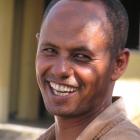
Country Director | IRC Ethiopia
Lemessa Mekonta is the Country Director for IRC WASH Ethiopia based in Addis Ababa.
He has diversified and hands on experiences in different aspects of water resources, water supplies, and sanitation working for government, private businesses and NGOs in various capacities ranging from expert to managerial level. Key areas of his experiences include program strategy development, partnership facilitation and coordination with different actors, project management, provision of trainings on water supplies, study and design for rural and urban water supplies, urban water utility management, water quality monitoring, leading action research including rural water supply operation and maintenance with appropriate technology identification and use, and private service providers engagement.
Lemessa is a hydrogeologist by background with over 23 years' experience in water and sanitation sector.
Data was collected on household income, diarrhoeal disease occurrence, water service provision, and sanitation and hygiene services and practices at... Read more...
Whether you live in the countryside or city in Ethiopia, your water may be unsafe to drink. Household water treatment is one way we can improve its quality. Read more...
The report provides specific recommendations for woreda-level planning of Self-supply acceleration activities, market and business development, and... Read more...
Factors influencing and inhibiting the success of reporting, processing and acting on the results of data. Read more...
Decision-support tool to aid the identification of potentially appropriate drinking water methods for arsenic- and salt-mitigation in Bangladesh... Read more...
The costs of a pilot small-scale container-based sanitation service (CBS) were higher than those of large-scale waterborne sewerage, but economies of... Read more...
My Water, My Business 2016 is an exhibition and seminar focused on Self-supply and linked to World Water Day 2016. The ambitious aim this year is to bring together different approaches to household-level provision, so going beyond domestic water supply to include household irrigation, water... Read more...
While implementation of the Self-supply approach in Ethiopia is not yet proven, t he expectations placed on this service model are huge. Nevertheless... Read more...
Excreta disposal issues, urban sanitation, weak community participation, hygiene promotion design, sustainability and the emergency development... Read more...
From 7-9 September 2015, IRC, the Millennium Water Alliance- Ethiopia Program (MWA-EP) and the Ministry of Water Irrigation and Energy (MoWIE) facilitated a national learning retreat on Self-supply. Participants came together in Butajira: a small town in Meskan in the Southern Nations,... Read more...
Poster presented at the 2015 UNC water and health conference. Read more...
This case study examines how the Multiple Use water Services (MUS) approach was applied in Kalu to develop joint domestic water supply and irrigation... Read more...
This case study examines how a productive element was added to community water supply in Kamba to increase both water and food security. Read more...
The Millennium Water Alliance Ethiopia Programme (MWA-EP) has experimented with the Multiple Use water Services (or MUS) approach to improve water... Read more...
In Ethiopia, the Self-supply approach for rural water supply is expected to fill gaps left by other service delivery models including community water... Read more...
This study identifies the effectiveness, costs and cost drivers of SODIS, ceramic filters and biosand filters. Read more...
Safe disposal of children's faeces is as essential as the safe disposal of adults' feces and yet in most countries analysed, over 50 percent of... Read more...
Presentation by Luuk van Kempen, for the IRC Seminar, The human factor in WASH change processes: drivers for change among staff of WASH sector... Read more...